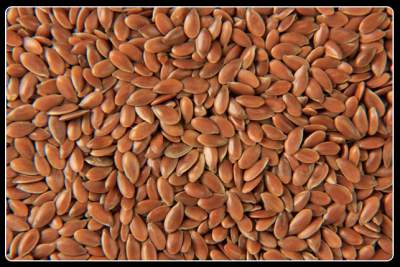
Seven Great Benefits of the Flaxseeds
17-06-2017 | Posted By: Shagun Parasher | 3080 View(s)
Flaxseeds, also known as Alsi, are the seed of plant Linum Usitatissimum. This seed has many medicinal benefits. Many people utilise the seed for conditions related to the gastrointestinal (GI) tract. Such conditions include constipation, damage to the colon due to the overuse of laxatives, diarrhoea, inflammation of the large intestine, irritable bowel syndrome, sores, etc. Flax seeds are also consumed for the disorders of the circulatory system (heart blood vessels) including high cholesterol, high blood pressure, hypertension and coronary heart diseases.
Flaxseed plays a significant role in curing acne, Attention Deficit Hyperactivity Disorders (ADHD), breast pain, kidney-related disorders, obesity, diabetes, depression, malaria, and rheumatoid arthritis.It is known to cure cough and sore throat. People largely consume flaxseeds for lowering their chances of breast cancer, lung cancer, colon cancer and prostate cancer.
How do Flaxseeds work?
Flaxseeds are rich sources of dietary fibre and omega-3 fatty acids. If flaxseeds are consumed before meals, it tends to make people feel less hungry, so they eat less. It happens because of the fibre that is present in the seed coat. This fibre bounds with the cholesterol found in the intestine and hinder its absorption. Flaxseeds also make platelets (cells responsible for blood clotting).
Flaxseeds are tried to prevent and treat cancer because they’re broken down into ‘’Lignans’’. The exposure to Lignans at the age of adolescence helps reduce the risk of breast cancer and increase the survival of patients with breast cancer. Lignans interfere with the growth and spread of tumour cells and thus prevent cancer.
An ounce (approx. 3tbsp) of flaxseed contains:
• Omega-3(ALA) 6,338mg
• Fiber 8gm
• Protein 6gm
• Vitamin B1 31% RDA
• Manganese 35% RDA
• Magnesium 30% RDA
• Phosphorus 19% RDA
• Selenium 10% RDA
• Flaxseeds also contain a good amount of vitamin B6, Iron, potassium, copper and zinc.

Seven Benefits of the wondrous Flaxseeds
1.High in fibre, but Low in Carbs
Flaxseeds consist of elevated levels of mucilage gum content. Mucilage is a gum forming fibre that helps the stomach to retain food for longer durations and thus increase the nutrient absorption. One should consume fibre rich foods every day.
2.Lose weight by eating Flaxseeds
Flax seeds consist of fibre inside its seed coat. These tissues help losing weight as when a person consumes flaxseed before the meals; it increases the satisfaction level of a person and then they end up consuming fewer calories thus losing weight.
3.Good Hair, Good Skin.
The ALA fats in flax seeds are beneficial for the skin and hair as they provide essential fats and b-Vitamins which help to reduce the dryness. Consume Flaxseeds daily for healthy skin, hair and nails. Consider adding 2 tbsp flaxseeds to those yummy smoothies and salads.
4.More the Flaxseeds. Lesser is the Cholesterol
Flax Seeds beautifully reduce the cholesterol levels in the body. People with high cholesterol levels should include flaxseeds in their daily diet. The water-soluble content of flaxseeds traps fats and cholesterol in our digestive system and makes it unable to be absorbed. This eventually results in the excretion of Bile, forcing the body to produce more, using up excess cholesterol in the blood and lowering the cholesterol level.
5.Promotes Digestive Health
Flaxseeds help in improving the digestive health of individuals. The ALA content that is present in Flax can help protect the digestive tract lining and maintain Gastro Intestinal health. It also treats constipation and gut’s inflammation.
6.Rich in Antioxidants (Lignans)
Flaxseeds are rich in antioxidants. Lignans are polyphenols which provide benefits for anti-aging, maintains hormone balance and cell- health. They also support probiotic growth in the gut and thus remove yeast in the body.
7. Flaxseeds are Gluten-Free
Flax seeds don’t contain gluten so they can easily replace the grains that contain gluten. Gluten consisting of grains are inflammatory; therefore, Flaxseeds are highly recommended to people who have gluten sensitivity.
How to Consume Flax Seeds:
There is a lot of debate as to how Flax Seeds should be consumed as if it is not chewed properly it can be flushed out of the system undigested. It, therefore, makes more sense to go in for Ground or milled flax seeds. Flaxseed oil can also be used as a healthy cooking medium. There are various other ways in which it can be consumed.
1. It can easily be added to flour while making chapatis or just added in the batter for making cakes, Bread or other delicacies at home.
2. It can enrich the breakfast by adding it to cereals, oats, salads, muesli and other things which form part of your morning meal.
3. Flaxseed powder can be added to Milk Shakes and even smoothies or any other drink
4. A Tea Spoon or 1/2 Teaspoon of Flaxseed powder can be taken directly with water in the morning
We have described above the nutritional content, various health benefits of flaxseeds and how we should be consuming them. They are among the most beautiful ways to resolve many issues related to hair, skin, nails, cough, inflammation, etc and can help us a great deal in solving a lot of health Issues too and as such should definitely be part of our diet.


